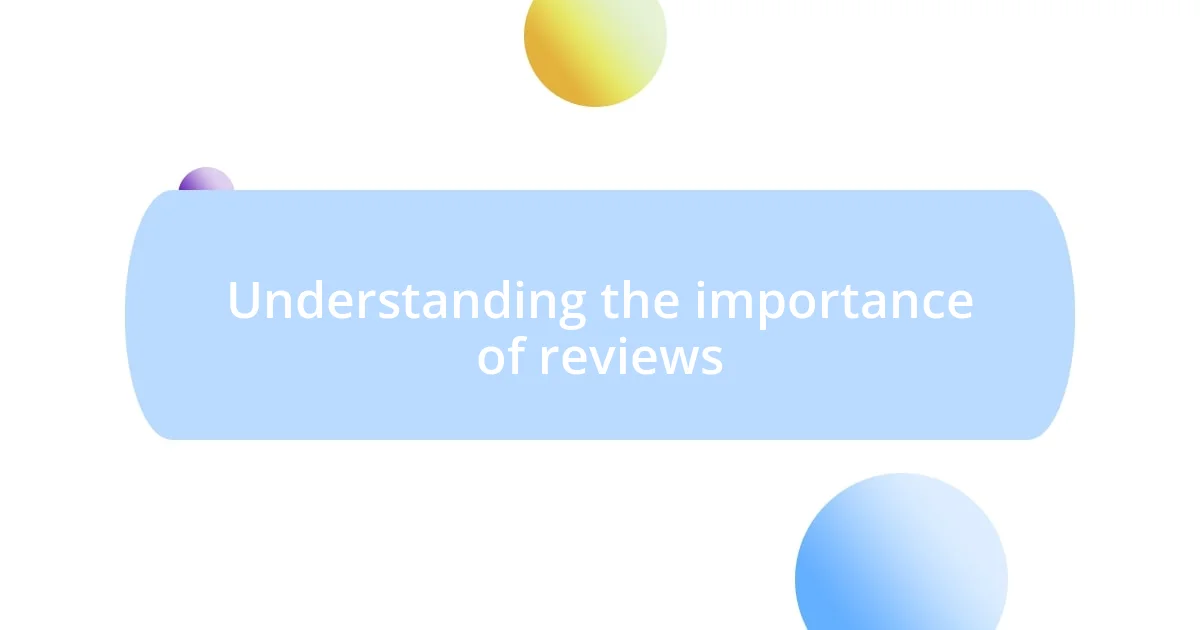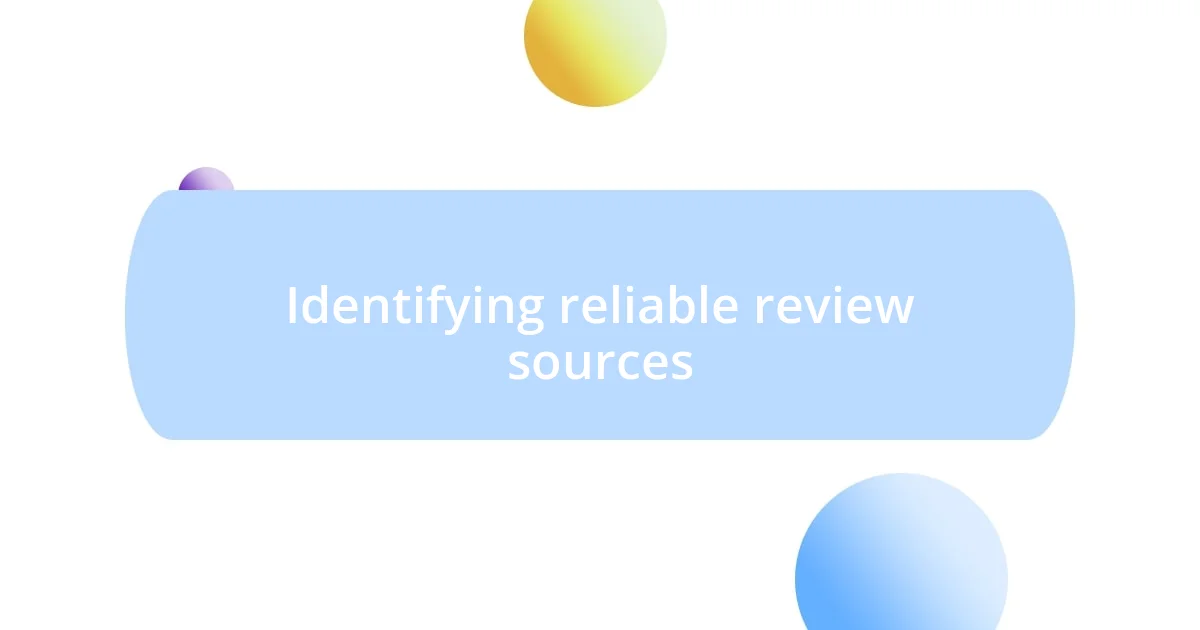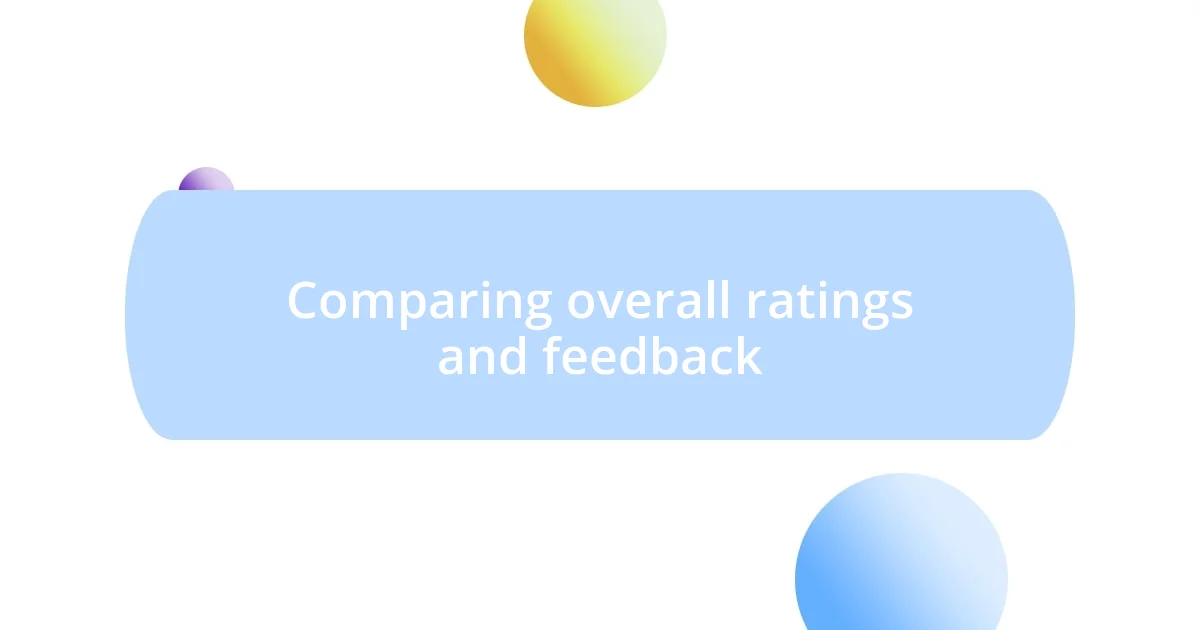Key takeaways:
- Reviews significantly influence hotel choices, providing insights into personal experiences and hidden gems that official descriptions may overlook.
- Researching diverse review platforms and filtering options enhances the booking process, ensuring selections are informed by a variety of perspectives.
- Comparing overall ratings and engaging with detailed feedback, especially recent reviews, is crucial to making choices that align with personal preferences and current hotel conditions.

Understanding the importance of reviews
Reviews hold immense power in the travel landscape. Reflecting on past trips, I remember how a single negative review changed my mind about a hotel I was eyeing. It wasn’t just the complaints about cleanliness; it was the way the reviewer’s disappointment resonated with me. Can you imagine arriving at a place only to find it doesn’t live up to its promises?
When I book a hotel, I dive into the details of the reviews, seeking the emotions behind the ratings. A glowing review can evoke excitement, while a lackluster one often sparks concern. Has anyone else felt that twist in their stomach when a source of joy suddenly feels like a risk? These insights paint a clearer picture of what to expect.
Furthermore, reviews often reveal hidden gems that official descriptions can gloss over. Once, I found an incredible boutique hotel that had slipped under my radar because of its humble marketing. It was the heartfelt testimonials about the staff’s kindness and the cozy atmosphere that struck a chord with me. Isn’t it fascinating how the experiences of others can shape our own journeys?

Researching hotel review platforms
When I start researching hotel review platforms, I look for variety. Popular sites like TripAdvisor and Booking.com offer a plethora of opinions, but it’s the niche platforms that often provide a more unique perspective. I remember once discovering a platform focused solely on eco-friendly hotels, which not only aligned with my values but also introduced me to options I’d never considered before.
Here are a few aspects I consider when researching hotel review platforms:
- User Base: A diverse range of users often leads to a more balanced set of opinions.
- Filter Options: The ability to filter reviews by traveler type (e.g., families, couples) helps tailor my search.
- Response Rate: Noticing how hotel management responds to reviews can give me insights into their customer service approach.
- Date of Reviews: I pay attention to whether recent reviews are available; this helps gauge current conditions.
- Review Verification: Reliable platforms verify reviews to prevent fake submissions, which builds trust in the feedback received.
Diving deeper into these aspects not only enriches my hotel search but also makes the booking experience feel more informed and personal.

Identifying reliable review sources
When it comes to identifying reliable review sources, I often start by examining the credibility and reputation of the website itself. Personal experiences have taught me that established platforms like TripAdvisor and Booking.com have built a solid foundation over the years, offering a blend of quantity and quality in reviews. Not long ago, I relied on a relatively unknown site, only to find its reviews were outdated and questionable. The lesson? Sometimes, sticking to well-known sites can save me from unpleasant surprises.
Another critical aspect is the diversity of the reviews. I tend to appreciate when platforms allow filtering by traveler type—whether it’s families, couples, or business travelers. Just last summer, I booked a hotel based on a family’s review about the kid-friendly amenities. The smiles on my kids’ faces at check-in were worth every moment spent searching. Wouldn’t you agree that firsthand accounts tailored to your needs make all the difference?
Finally, I always check for authentic interaction between reviewers and hotel staff. A quick look at how management responds can reveal a lot about their commitment to guest satisfaction. I vividly recall a time when a hotel manager addressed a negative review personally, promising changes. The changes made inspired my trust, leading me to book a stay there later. Isn’t it reassuring when a hotel is transparent and engaged?
| Review Source | Pros |
|---|---|
| TripAdvisor | Large user base, diverse opinions |
| Booking.com | Verified reviews, easy filtering |
| Niche Sites (e.g., Eco-Friendly) | Unique perspectives, specialized focus |

Analyzing review content and trends
To analyze review content effectively, I always start by identifying recurring themes. For instance, if several reviewers mention cleanliness or comfort, it signals that those aspects are consistently part of the experience. I remember a recent trip where the glowing reviews consistently highlighted the hotel’s cleanliness. When I arrived, I found the sparkling bathrooms and fresh-smelling linens matched those high expectations perfectly. Isn’t it amazing how trends in reviews can set the stage for what you feel upon arrival?
Another tactic I utilize is paying attention to the nature of feedback—both positive and negative. Are the criticisms specific or vague? For example, I once read a review that described a mattress as “comfortable yet too soft for my liking.” This helped me understand not just the mattress quality but also the potential variability in comfort preferences. It’s crucial to discern whether the con is a deal-breaker for me or simply a personal taste issue. Have you ever had a similar experience where a detail made all the difference in your choice?
Lastly, I find it particularly insightful to spot patterns across different platforms. If a hotel gets consistently high praise on one site and lower ratings on another, it raises questions. This happened to me with a boutique hotel; while TripAdvisor users raved about its uniqueness, Booking.com reviewers cited poor service. Given my preference for personalized service, I opted out. You can sense how researching multiple sources adds layers to my decision-making. It really enriches my understanding and leads me to make choices that resonate with my needs and desires.

Comparing overall ratings and feedback
When I’m comparing overall ratings, I look beyond just the numbers. It’s those star ratings that initially catch my attention, but diving into the feedback reveals much more. I recall a time I booked a highly-rated hotel that flaunted a near-perfect score. However, as I scrolled through the reviews, I noticed that while many praised the location, several others commented on the unhelpful staff. That discrepancy made me reconsider my choice. Don’t you think a high rating means nothing if the service doesn’t match?
Engagement with reviews is just as important as their overall ratings. I often find it enlightening to read through detailed testimonials rather than just glancing at the averages. There was a hotel I almost booked with a 4.7 rating, yet the reviews told a different story—repeated mentions of thin walls and noise issues surfaced. Coupled with my penchant for peace and quiet, this feedback changed my mind entirely. Could personal experiences shared in reviews be the deciding factor in your hotel selection too?
I also pay attention to the nuances within the feedback, especially the recent reviews. When I was planning a getaway last winter, a hotel had a string of excellent ratings from the previous summer, but more recent visitors reported declining service. This kind of trend makes a considerable impact on my decision-making. After all, I want a stay that reflects up-to-date quality. How often have you relied on the freshness of reviews to steer your choices? It really opens your eyes to how quickly things can change in the hospitality world.

Finalizing your hotel selection process
When I finally narrow down my hotel choices, I take a moment to reflect on everything I’ve learned from the reviews. Recently, during a search for a beach getaway, I found two hotels that seemed equally appealing. However, one consistently received feedback about fantastic sunsets from guests, while the other focused more on amenities. I ended up choosing the first hotel, knowing that those sunset views were something I’ll cherish. Have you ever chosen a place based on those little details that just resonate with you?
I also find it helpful to create a pros-and-cons list for my top contenders. This method became particularly useful when deciding between a trendy urban hotel and a cozy, more secluded spot. The urban hotel had a great nightlife scene, while the quaint location boasted stunning nature trails. Writing down both sides clarified my priorities, and I realized that I craved a peaceful retreat more than excitement. Have you ever found a written list to bring clarity during decision-making?
To wrap up my selection process, I cross-reference the reviews with my own preferences and values. Recently, I faced a choice between two hotels where one was significantly more affordable but came with complaints about noise. With my sensitivity to sound while sleeping, I quickly realized that the cost savings might not be worth a restless night. It’s interesting how aligning your choice with personal standards can make a profound impact on your travel experience. How do you ensure your final selection matches your unique needs and expectations?














